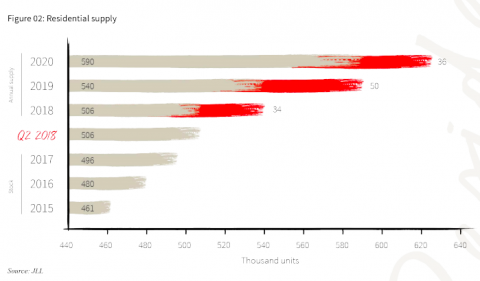Increased foreign demand could boost Dubai’s real estate market
Increased foreign demand could boost Dubai’s real estate market
UAE government announcements to allow 100% foreign ownership outside of free zones and reduce the market fee on businesses from 5% to 2.5% to stimulate demand in the Dubai property market, says JLL.
This quarter, the Dubai Government has made a number of announcements designed to promote foreign investment and investor confidence, which is likely to boost demand in the office market in the medium term, says JLL's latest report: Dubai Real Estate Market Overview Q2 2018.
Two key announcements have been made during Q2 as the government seeks to stimulate demand and support the office market. These include a reduction in the fee charged on businesses by the Dubai Municipality from 5% to 2.5%, and the relaxation of existing regulations to allow 100% foreign ownership in businesses located outside of free zones.
"These new government announcements should help improve market sentiment and have the potential to directly increase investment and office occupancy across the emirate. The potential surge in foreign investment, particularly from businesses operating in the non-oil sector, could ultimately lead to a boost in demand for quality commercial space,"' said Craig Plumb, Head of Research, JLL MENA.
"Although there were no office completions this quarter, the availability of space increased across the CBD over the past year, with around 10% of the current stock being vacant. This is favourable to tenants, providing them with an increased choice of potential premises in a market where demand for quality space remains high. Demand is likely to persist as a result of the relaxation of foreign ownership requirements," he continued.
The Government's strategy to attract foreign investment was further demonstrated by Dubai retaining its position as the most transparent real estate market in the region, according to JLL's recently released Global Real Estate Transparency Index for 2018.
The Dubai Land Department continues to focus on attracting more investment through increased transparency in line with a mission to establish Dubai as one of the world's premier real estate destinations.
"The increased transparency, coupled with new initiatives to attract further foreign investment paint a positive outlook for Dubai's real estate sector overall," he continued.
The recent announcement of 10-year residency visas for certain categories of staff is also likely to have a long-term positive impact on the residential sector, providing expatriates with more confidence and certainty on their right to remain in the UAE and boosting sales activity.

JLL's latest report details residential supply and demand in Dubai. Image credit: JLL
Although the property market continues to face pressure, the longer-term outlook is positive, supported by the hospitality market, which is expected to receive an influx of visitors, particularly in 2020 / 2021 with the World Expo.
This quarter the hotel sector in Dubai was one of the few local markets to witness a stronger performance during Ramadan than the previous year. Typically, the Holy month of Ramadan sees a reduction in hotel night demand followed by a spike during the Eid holidays. Despite room rates and occupancies declining over the first 5 months of the year, compared to the same period in 2017, Dubai remains one of the top performing hotel markets globally.
To view the full report, go to the JLL MENA website.
For more information about the Dubai Real Estate Market Overview Q2 2018 report, email Craig Plumb of JLL MENA via the contact details below.
See also:
Dubai Land Department to attract foreign investment portfolios and develop Dubai's mortgage law
Affordable housing driving Riyadh’s real estate market, says JLL
Growth of private debt to boost Middle East real estate market, JLL reports




